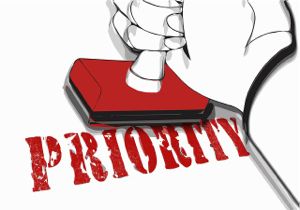Would you like to simplify your writing life?
Most writers struggle to manage all the activities involved with writing, editing, publishing, marketing, and keeping up with the rest of their lives.
Few would turn down a chance to simplify somewhere, if only to make things a little bit easier.
There are many ways you can go about simplifying, from clearing out clutter to streamlining some of your daily activities to employing new apps or other tools to help you get things done more quickly.
But I think one of the most effective ways is to take stock of how you feel about your writing life right now.
If everything’s going well, there may be no need to simplify. If not, asking yourself a few key questions can help you get to the heart of those things that are getting in your way.
To that end, I have eight questions for you below.
 What Does Simplifying Your Writing Life Mean?
What Does Simplifying Your Writing Life Mean?
The writing life has become more and more complicated over the past decade or so, mainly because of the fast-paced adoption of new technologies that have opened new doors for writers and publishers.
Now most writers are taking on the role of entrepreneur, which means they have to wear many different hats to accomplish their goals. Jumping from writing to updating social media to running a giveaway to editing your next book to art directing your self-published cover takes a lot of energy and skill.
Amidst all that, there are a number of other ways to market and build an author platform that we want to get to but we struggle to find the time for.
That can leave us feeling like we’re perpetually behind, and always trying to catch up. Plus there is so much to learn about using new technological tools that we can start to feel like we’ll never get where we want to go.
If you’re experiencing some of these feelings or thoughts now, the following eight questions should help you to trim the fat in your daily routine and focus in on those activities that really matter.
8 Questions to Help Writers Simplify the Writing Life
 1. What do I regret saying “yes” to?
1. What do I regret saying “yes” to?
Think back on the last six months, and ask yourself this question. Are there things you agreed to do that you later regretted? Are you spending your time on things that you don’t enjoy, or that aren’t bringing you the results you expected?
One of the best ways to simplify, of course, is to say “no” more often, but sometimes we get caught up in the moment and think, “Oh cool, this would be fun” or “So-and-so is doing this and it’s working well for her, so I should try that.” But then you find out later that even though the activity was fun, it didn’t do much for your writing goals, or it didn’t help your sales as much as it seemed to help your friend’s.
Looking back on how you felt in the moment you said “yes” as opposed to how the project actually turned out can help you evaluate those things that compel you to say yes, so that perhaps you may take more time next time around to evaluate whether the project is worthwhile. Remember that the fewer activities you have to do each day, the more relaxed and stress-free you’ll feel, and the more likely you’ll be able to do those projects you choose to do well.
 Simplify Your Writing Life Tip 2. What builds up on my counter or in my inbox?
Simplify Your Writing Life Tip 2. What builds up on my counter or in my inbox?
Every year I do something that makes sense at first, but then doesn’t in the long-term.
You know those catalogs we all get in the mail at Christmas? I end up keeping several of them, as they have unique gifts I think I may purchase for friends and family. I mark pages that have items I’m interested in, and plan to return and possibly order later, but then I never do.
I’ve repeated this behavior for years, and the stack of catalogs (thankfully refreshed each year) remains on one of my shelves as one of those things I’m “going to do.”
You may have something similar—your “when I get time” activity.
Maybe you have emails or e-newsletters you keep for when you “get a chance” to read them. Or you have magazines stacking up on the counter for when you get a moment to sit and browse.
These items can clutter up your workspace, computer space, and even your brain, creating a sort of residue that can bring you down over time. Clearing out those items can lighten your load and help you feel more energy to tackle those things that you actually are doing each day.
“Our time in life is limited,” say the good folks over at Ideal-Living, “but we treat it like we will always have another tomorrow, saying ‘I’ll take that class one day,’ or ‘I’ll start on it tomorrow.’ But how much time do you waste checking websites that you don’t enjoy that much or mindlessly scrolling through social media? Think about the few e-mails, magazines, or TV shows that make you really excited when they arrive. Keep those and get rid of the rest. Trust us…you’ll never miss them.”
 3. What am I responsible for?
3. What am I responsible for?
This is a great question, because it forces you to list all those things you’ve taken on in your life, and all those people you have to answer to.
Sometimes your responsibilities can pile up over time and pretty soon you feel like you’re drowning.
When you first took on the responsibility of helping to plan your friend’s wedding, it didn’t seem like that big a deal. But then there were delays in getting things set up, and suddenly you’re trying to scramble to get a venue together for the bachelorette party the same week your novel edits were due.
Meanwhile, you’re in charge of setting up a special event for your writer’s group next week, and you promised to help with your son’s first grade class field trip. Your boss is expecting a report on the new project you took on at work, and you also promised your mom that you’d help her find a contractor to build a new roof.
What happened? Suddenly you’re responsible for a zillion things and you didn’t plan it that way. Taking stock of all these things can help give you the power to do something about it, like ask for help, or put in place rules for yourself so you don’t get into the same situation again. (No more than two extra projects a month, for example.)
 Simplify Your Writing Life Tip 4. What are my mornings like?
Simplify Your Writing Life Tip 4. What are my mornings like?
I don’t know about you, but if something happens to mess up my morning, it throws off the whole day.
I have a routine that starts out with my personal projects, then moves directly to my freelance projects so I finish before I run out of mental steam and motivation.
If I have to tend to a special event, however, or make calls or address some other issue, all that gets pushed back and before I know it, I’m yawning and chewing gum like mad trying to keep myself alert enough to keep going until my freelance work is finished. Suddenly the day seems anything but simple.
Most of the time, however, my mornings are calm, relaxed, and productive. How about you? If yours could use some help, check out our post, “How to Use Your First 2 Mornings to Boost Productivity.”
 5. Is my daily routine healthy and energizing?
5. Is my daily routine healthy and energizing?
This question helps you focus on how you feel throughout the day. We all have energy ups and downs, but overall, do you feel motivated and energized? Are you waking up eager to get going on your day? Or do you dread what lies ahead of you?
When you feel good, your day will naturally feel easier to you. Making sure you’re eating nutritious foods, exercising every day, and taking part in some sort of stress-relieving activity—even though these things take time—will ultimately help you feel like your life is simpler.
Writing will be easier, too, as these activities support your creativity.
 Simplify Your Writing Life Tip 6. What are my priorities?
Simplify Your Writing Life Tip 6. What are my priorities?
This is a good question to ask yourself at regular intervals.
We all have the best intentions of sticking with our priorities, but then life gets in the way, and pretty soon we’re running around doing a number of other things that if we stopped to think about it, we’d realize had nothing to do with our priorities.
So ask yourself this question, and then follow it up with, “Am I spending enough time on my priorities?” This can help you reorganize your schedule, if needed, so you’re again focusing on those activities that matter most of you.
If you’re caught up in marketing activities that you’re not sure are helping your career, ask yourself if these activities are aligned with your purpose as a writer. If not, maybe there’s a way you can personalize your marketing tasks so they reflect more of what you stand for as a creative individual, and what you’re trying to bring to your readers.
 7. How much information am I exposed to each day?
7. How much information am I exposed to each day?
The answer to that for most of us is “too much,” but it’s a good idea to think about it, anyway.
Every time you expose yourself to information, whether from the television, Internet, social media, radio, or other sources, you’re forcing your mind to not only take it in, but process what it means and what it means to you, and then decide what you’re going to do about it.
Let’s say you hear about a natural disaster that occurred in a foreign country. First, you have to take in the information, and go through the emotional response it may create in you. Then you have to decide what it means to you—is this something that matters to you? If so, you then have to decide what you’re going to do about it, and that may not be easy. Are you going to donate to a national organization? Organize a grass roots program to help? Try to assist in some other way?
All this takes up time and mental energy, and can pull you away from your priorities.
And this is just one example. We are exposed to countless stories, reports, and other information around us every day, all of which we have to decide how to manage.
You can simplify your life by limiting how much information you allow into your life each day. Simply shut the gadgets off at certain times, and allow that information to come at you only when you’re ready for it.
 Simplify Your Writing Life Tip 8. What would happen if I stopped…?
Simplify Your Writing Life Tip 8. What would happen if I stopped…?
Just answer this question. Don’t think about it too much. See what comes out.
This is a fun question as it can reveal things you’ve been thinking about but didn’t really realize you were thinking about—things in your life that aren’t serving you anymore, and that you’d like to stop doing.
Take 5-10 minutes to list everything that comes to mind, then look over your list. Are there things there you could get rid of? Even if it might be complicated to do so, how would your life look if you no longer had to do this thing? How might you feel? Would you feel lighter and more energized?
If so, that’s an easy way to simplify. Another thing that you can ask yourself is, “What benefits am I getting out of this activity?” If you’re not sure whether or not you should dump something, that question may help reveal the answer.
How do you simplify your writing life?


Adjusting my expectation of what I can realistically write in a day has been my challenge. In the past, I’ve aimed for a word count, a number of pages, or a chapter. Now I find that finishing one scene a day works best. Having a natural place to end is very satisfying and leaves me in a better frame of mind when I face the non-writing parts of my life.
It’s a process figuring out what works, for sure. Glad you found your sweet spot, Kit! :O)
I’m gradually making the shift to writing an hour each morning, otherwise I am too tired to do it justice in the evening. Also, limiting how much info we expose ourselves is key. I am no longer looking at my phone as I drink coffee. Too many distractions!
That’s awesome, Jeri. You’ll definitely rack up the pages now. And yes, distractions be gone!